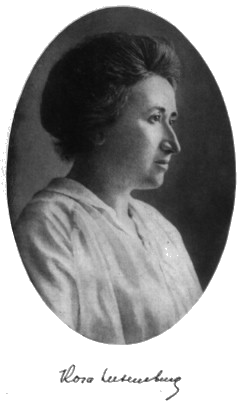Rosa Luxemburg, 1870-1919.

The Polish-born "Red Rosa" is perhaps best known as one of the leaders in the 1919 Spartacist
Revolution in Germany which ended with her murder while in the custody of the German army.
She had been the founder of the Polish Social Democratic Party and headed the left wing of
the German Social Democratic Party.
Although her early challenge to Engels on the tactics of the
left and her role in the 1919 German Revolution are perhaps best known, it is in her role
as a Marxian theoretician that she concerns us here.
Luxemburg was no fan of the "revisionist" theory of Eduard Bernstein and was, together with Kautsky,
the main defender of Marx against Bernstein's
critiques - stressing again the issues of imperialism and finance capital which she felt
Bernstein had overlooked. Her attack on Bernstein in Social Reform or Revolution
(1899) was a very effective - if bitter - destruction of the revisionist arguments.
In her famous treatise, The Accumulation of Capital (1913), she entered into the
"crises debate". Her particular contribution was to note that in a
"closed" capitalist system, eternal accumulation of capital is impossible as it
cannot absorb all the surplus value it produces. By accessing non-capitalist
socialist formations, this breakdown could be forestalled. Thus, Luxemburg
sets forth her theory of Imperialism as the conflict between capitalist nations for a
places to dump their excess consumer goods and thus forestall crises.
As a result, she argued that much of the pre-war instability arose from the
"capitalist-imperialist" conflict among the great European powers.
Luxemburg was the main leader of the "Spartacus League" formed during the World
War I to counter the German Social Democrats' support of the war. She was duly
arrested for her opposition and released only in 1918 -- just in time for her to lead the
ill-fated German revolution of 1918 with Karl Liebnicht.
|
| |
|
Major Works of Rosa Luxemburg
- "Der englische Bergarbeiterstreik",
1893, Sprawa Robotnicza
- "Wie entstand die Maifeier?",
1894, Sprawa Robotnicza
- "Der erste Kongreß der deutschen Bergarbeiter",
1895, Sprawa Robotnicza
- "Opportunism and the art of the possible",
1898, Sachsische Arbeiter zeitung (German
version)
- "Reden auf dem Stuttgarter Parteitag",
1898 (unpubl.)
- "Miliz und Militarismus",
1899, Leipziger Volkszeitung
- "Eine taktische Frage",
1899, Leipziger Volkszeitung
- "Hohle Nüsse",
1899, Leipziger Volkszeitung
- "Unser leitendes Parteiorgan",1899,
Leipziger Volkszeitung
- "Reden auf dem Parteitag in Hannover",
1899 (unpubl.)
"Um die Beute",
1900, Leipziger Volkszeitung
- Social
Reform
or Revolution?, 1899 (German
version).
- "Die »deutsche Wissenschaft« hinter den Arbeitern",
1900, Die Neue Zeit
- "Der Parteitag und der Hamburger Gewerkschaftsstreit",
1900, Die Neue Zeit
- "Vor Ludwigshafen",
1902, Leipziger Volkszeitung
- "Martinique",
1902, Leipziger Volkszeitung
- "Stagnation and Progress of Marxism"
1903 (publ. 1927)
- "Social Democracy and Parliamentarism",
1904, Sachsische Arbeiter zeitung
- "Organizational Questions of the Russian Social Democracy",
1905, Neue Zeit
- "The Revolution in Russia",
1905, Zeitschrift fòr die Interessen der Arbeiterinnen
- "Socialism and The Churches",
1905
- The Mass Strike, the Political Party and the Trade Unions,
1906 (German version)
- "Einführung in die Nationalökonomie",
1909 (unpubl)
- "Der politische Massenstreik und die Gewerkschaftenerman
version", 1910 (unpubl.)
- "Mass
Action", 1911 (unpubl)
- Frauenwahlrecht und Klassenkampf,
1912
- Accumulation of Capital, 1913. (in
German)
- "Rebuilding
the International", 1915, Die Internationale
- The
Crisis of Social Democracy: The Junius pamphlet, 1916 ( German
version)
- "The War and the
Workers: Junius Pamphlet, 1916.
- "The Russian
Revolution", 1918 (publ. 1921, German
version)
- "The Russian
Tragedy", 1918, Spartacus
- "The
Beginning", 1918, Die Rote Fahne
- "The Socialization of
Society", 1918, Die junge Garde
- Five Letters from Prison,
1918.
- "Order
Prevails in Berlin", 1919, Rote Fahne (German
version)
- "Das Versagen der Führer",
1919, Rote Fahne
- "Kartenhäuser",
1919, Rote Fahne
- Collected Works, 1922.
|
 Top
Top
-----------------------------------------------------------------------------------------------------------------------------------------------------------------------------------------------------------

